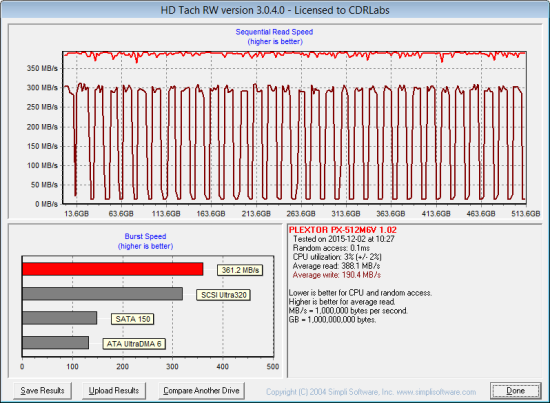TRIM Performance:
While SSD's offer many benefits, there are some downsides to using flash memory. One of the biggest issues people run into is performance degradation. Over time, an SSD will run out of fresh blocks and will have to write over data the file system has marked as deleted. This procedure is very complicated and can slow an SSD's write speeds considerably.
To fix this problem, most manufacturers have added TRIM support to their SSDs. The TRIM command allows an operating system, such as Windows 7, to tell an SSD which data blocks are no longer in use. Using this information, the drive pro-actively erases these blocks and adds them to the free block pool.

To test the M6V's TRIM and garbage collection functions, I first put the drive in a "dirty" state. I used Iometer to fill the entire drive and then ran a random write test for 30 minutes. This had little impact on the M6V's read speed. However, its average writing speed dropped to 190.4 MB/s.

Plextor M6V - Dirty
To see how well the M6V could recover, I let the computer sit for about 45 minutes and then reran the test. The drive wasn't able to reach the factory fresh performance shown in our earlier tests. However, its average write speed climbed up to 293.1 MB/s.

Plextor M6V - After TRIM
Lastly, I used Plextor's Plextool software to perform a secure format on the M6V. With the drive wiped clean, it had average read and write speeds of 392.3 MB/s and 304.2 MB/s, respectively.

Plextor M6V - Secure Erased
Final Thoughts:
As Plextor themselves point out, the M6V isn't the fastest SSD on the market. Instead, the drive was designed to provide the best possible value to the average consumer. And, by combining Silicon Motion's SM2246EN controller with Toshiba's 15nm Toggle Mode MLC NAND, the M6V is able to deliver a fast and responsive computing experience at a price that won't break the bank. In our sequential read and write tests, the 512GB version of the M6V was able to read at speeds as high as 564 MB/s and write at speeds in excess of 453 MB/s. It also did surprisingly well in our random write tests, producing more than 70,000 IOPS at low queue depths. This is better than what we've seen with most budget-priced SSDs. However, it wasn't enough to top the Samsung 850 EVO.
With its lower price tag, it shouldn't be too surprising that the M6V's feature set isn't as extensive as Plextor's other SSDs. The drive is compatible with the company's Plextool software and comes equipped with their PlexTurbo smart cache technology, but lacks support for things like PlexVault and PlexCompressor. The M6V doesn't offer support for Device Sleep (DEVSLP) or hardware based encryption either. This probably isn't an issue if you're looking for an SSD for your desktop computer. However, these are things you may want to consider if the M6V is going in a laptop or if data security is a concern.
The M6V is available now in 128GB, 256GB and 512GB capacities. Prices on Amazon.com currently range from about $65 up to $177 for the 512GB version reviewed here.

Highs:
- Available in 128GB, 256GB and 512GB capacities
- Good sequential and random read and write performance
- Performs equally well with compressible and incompressible data
- Supports PlexTurbo caching technology
- SATA 6Gb/s interface
- Toggle Mode MLC NAND flash
- Supports TRIM, SMART and NCQ
- Ultra-slim form factor
- 3 year warranty
- Affordably priced
Lows:
- Does not support DEVSLP
- Does not support hardware based encryption
- Lower capacity drives have slower sequential write speeds

